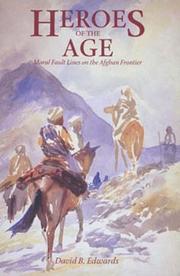| Listing 1 - 3 of 3 |
Sort by
|

ISBN: 0520200640 0520200632 9786613382146 052091631X 1283382148 1597346500 9780520916319 0585388830 9780585388830 0520900456 9780520900455 9780520200630 9780520200647 Year: 1996 Publisher: Berkeley University of California Press
Abstract | Keywords | Export | Availability | Bookmark
 Loading...
Loading...Choose an application
- Reference Manager
- EndNote
- RefWorks (Direct export to RefWorks)
Much of the political turmoil that has occurred in Afghanistan since the Marxist revolution of 1978 has been attributed to the dispute between Soviet-aligned Marxists and the religious extremists inspired by Egyptian and Pakistani brands of "fundamentalist" Islam. In a significant departure from this view, David B. Edwards contends that-though Marxism and radical Islam have undoubtedly played a significant role in the conflict-Afghanistan's troubles derive less from foreign forces and the ideological divisions between groups than they do from the moral incoherence of Afghanistan itself. Seeking the historical and cultural roots of the conflict, Edwards examines the lives of three significant figures of the late nineteenth century-a tribal khan, a Muslim saint, and a prince who became king of the newly created state. He explores the ambiguities and contradictions of these lives and the stories that surround them, arguing that conflicting values within an artificially-created state are at the root of Afghanistan's current instability. Building on this foundation, Edwards examines conflicting narratives of a tribal uprising against the British Raj that broke out in the summer of 1897. Through an analysis of both colonial and native accounts, Edwards investigates the saint's role in this conflict, his relationship to the Afghan state and the tribal groups that followed him, and the larger issue of how Islam traditionally functions as an encompassing framework of political association in frontier society.
Afghanistan. --- Afghanistan-- History. --- History. --- Afghanistan --- South Asia --- Regions & Countries - Asia & the Middle East --- History & Archaeology --- History --- SOCIAL SCIENCE / Anthropology / Cultural & Social. --- Afghanistan -- History. --- 1970s. --- 19th century. --- afghanistan. --- british colonies. --- colonial. --- colonialism. --- culture. --- egypt. --- extremists. --- folklore. --- fundamentalist. --- ideology. --- international politics. --- islam. --- islamic. --- marxism. --- marxist. --- middle east. --- middle eastern politics. --- middle eastern. --- morals. --- muslim. --- pakistan. --- politics. --- radical islam. --- religion. --- religious studies. --- revolution. --- soviet. --- tribal. --- world politics.
Book
ISBN: 3847425102 384741657X Year: 2023 Publisher: Verlag Barbara Budrich
Abstract | Keywords | Export | Availability | Bookmark
 Loading...
Loading...Choose an application
- Reference Manager
- EndNote
- RefWorks (Direct export to RefWorks)
How do young people find their way into Islamist contexts and towards Islamist positions? The authors conducted biographical-narrative interviews with young people, who held different positions in this field of ideological positions. They look at the actual forms and features of the particular worldviews and processes of (de-)radicalisation and show how individual notions of the self and the world are intertwined with social interaction within families, peergroups, radical groups, or official institutions. Obwohl es mittlerweile eine Vielzahl an Forschung zum Phänomen Islamismus gibt, wurden in nur wenigen Studien Interviews mit jungen Menschen mit islamistischen Orientierungen geführt und systematisch ausgewertet. In diesem Buch gehen die Autorinnen anhand autobiografischer Erzählungen den folgenden Fragen nach: Wie eignen sich junge Menschen islamistische Orientierungen an, wie hängen sie mit biografischen Erfahrungen zusammen und welche Funktion erfüllen sie in den Biografien? Die Autorinnen zeigen, dass die Orientierungen in jugendphasenspezifische Probleme von Grenzziehung, Handlungskontrolle, sozialer Positionierung und Vergemeinschaftung eingebunden sind und diese Probleme auf verschiedene Weise gelöst werden: Islamismus übernimmt dabei die Funktion der starken Grenze, die Funktion der starken Ordnung oder die Funktion der starken Gemeinschaft.
Social work --- adolescence;Adoleszenz;adolescents;Jugendliche;Islamism;Islamismus;Dschihadismus;jihadism;Salafism;Salafismus;political Islam;politischer Islam;Biografieforschung;biography research;Biographieforschung;radicality;radicalisation processes;Radikalität;extremism;Radikalisierungsprozesse;Extremismus;radical Islam;radikaler Islam;reconstructive social research;deradicalisation;rekonstruktive Sozialforschung;deradicalisation process;Entradikalisierung;Ausstiegsprozesse;Ausstieg
Book

ISBN: 3839456487 3837656489 Year: 2021 Publisher: Bielefeld transcript Verlag
Abstract | Keywords | Export | Availability | Bookmark
 Loading...
Loading...Choose an application
- Reference Manager
- EndNote
- RefWorks (Direct export to RefWorks)
In der öffentlichen Debatte wird Online-Videos aus dem Spektrum des radikalen Islam zugeschrieben, einen großen Einfluss auf junge Menschen auszuüben. Doch wie nehmen junge Muslim*innen und Nicht-Muslim*innen diese Videos tatsächlich wahr? Wie stark wird ihre Sicht auf die Inhalte von ihrem Religionsverständnis, ihrer sozialen Zugehörigkeit und aktuellen politischen und gesellschaftlichen Debatten in Deutschland beeinflusst? Diese qualitative Studie untersucht die Rezeption ausgewählter radikalislamischer Videos von Marcel Krass, Ahmad Armih (bekannt unter dem Pseudonym »Ahmad Abul Baraa«) sowie von Yasin Bala (»Yasin al-Hanafi«).
POLITICAL SCIENCE / Political Ideologies / General. --- Extremism. --- Fundamentalism. --- Internet. --- Islam. --- Media Reception. --- Political Ideologies. --- Political Science. --- Politics. --- Radicalization. --- Religion. --- Salafism. --- Sharia. --- Social Media. --- Sociology of Media. --- Youtube. --- Radikaler Islam; Salafismus; Scharia; YouTube; Medienrezeption; Religion; Extremismus; Radikalisierung; Politik; Islam; Internet; Politische Ideologien; Fundamentalismus; Social Media; Mediensoziologie; Politikwissenschaft; Radical Islam; Salafism; Sharia; Youtube; Media Reception; Extremism; Radicalization; Politics; Political Ideologies; Fundamentalism; Sociology of Media; Political Science --- YouTube (Electronic resource) --- Religious aspects --- Influence.
| Listing 1 - 3 of 3 |
Sort by
|

 Search
Search Feedback
Feedback About UniCat
About UniCat  Help
Help News
News